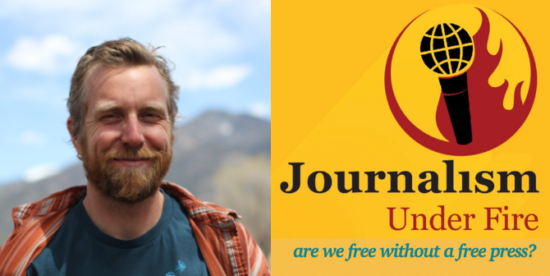
Sandy Campbell, Executive Director of the Santa Fe Council on International Relations (CIR), previews the upcoming conference (December 5-7) “Journalism Under Fire,” which convenes leading experts in media, journalism, and national security, as well as his hopes for the future of journalism.
Where did the idea for “Journalism Under Fire” come from?
In 2017, our Program Committee asked ourselves: What are the world’s greatest problems on which CIR might shed some light? From how press freedoms have changed in this country, not only by tweet but through corporatization and consolidation, to the murders of journalists in Turkey and Bulgaria, we saw how imperative the connection was between journalism and democracy.
I took this idea to the City of Santa Fe and won a small marketing grant. Once we secured two national partners, the Committee to Protect Journalists and the International Women’s Media Foundation, the conference was born. We’ve since assembled world-class journalists to speak, along with leading political cartoonists and photojournalists.
To top it all off, the U.S. Department of State is bringing Edward R. Murrow Fellows to the event. Over three days, we’ll cover freedom of the press, fake news, and persecution; journalism in Mexico and at the U.S.-Mexico border; the plight of local journalism; and break into small groups for Citizen Exchange Circles to network and learn from the journalists.
Disinformation and the role of media are global issues. What is your take on the current state of journalism and the American response to combatting disinformation?
The major themes of the conference are: are we free without a free press? Can we live in a free society without journalists pursuing the truth? An objective survey could reasonably conclude that press freedoms are declining, and that our core freedoms are under more pressure than we might imagine.
While many global leaders have become increasingly hostile to the press, steeper challenges come from the business model for journalism. Media outlets are consolidating, with the truth becoming subservient to political agenda or profit or both. No country is exempt; in the U.S., we are fortunate to have some exemplary organizations and individuals fighting for our press and freedoms. But so much more must be done. Our hope is that by highlighting these challenges, we can offer practical solutions or, at least better understanding of these troubling trends.
In your opinion, how can exchanges play a role?
We have 54 international journalists coming. For me, the magic is how they will hold a mirror to our own experiences and reveal our similarities. Every country maintains a different relationship between journalism and democracy, between information and disinformation; the more we learn about these relationships elsewhere, the more we learn about them here. We are grateful to the U.S. Department of State for believing in the power of exchanges in journalism and in this important event.
What does CIR hope to achieve?
I hope all participants come away with a renewed sense of hope and desire for action. While there are countless examples of journalists practicing under fire, I have to believe that our collective human need for freedom can check these current challenges, and that we can use this moment to remember, restore, and improve our core values. Without a free press, we cannot be free; what must we do to preserve it? What must we do to ensure the fourth estate has the power and the resources it needs to investigate, document, and publicize the truth?
For us as an organization, we believe staging a conference of this size is essential to our future. As we continue to grow as a leading local intellectual organization, we’re also solidifying our connections to the political, social, and economic forces in the state. We believe this will serve us for many years to come.
